
Welcome from our CEO
Read about our new energy reports on transparency in the fracking industry and opportunities in the cleantech sector.
Learn about our work on labeling GMOs and nanoparticles in food. Meet Cari Rudd, a shareholder activist and As You Sow supporter.
Keep up on our ongoing progress with consumer goods companies on packaging waste and creating slavery-free supply chains in cotton and conflict minerals.
Check out our new Talk Divest-Invest mentorship project, where As You Sow founder Tom Van Dyck speaks to university students about divesting from fossil fuels.
Thank you for your continued support of As You Sow as we make the protection of your health and the environment a central part of corporate decision making. Please feel free to share this with your networks and connect with us on Twitter, Facebook, or LinkedIn.
Thank you for your support.
Best,


Andrew Behar, CEO
Fracking Companies Fail on Disclosure to Investors
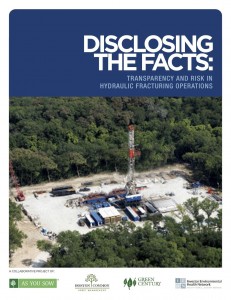
Disclosing the Facts
The hydraulic fracturing industry lacks transparency when it comes to environmental and community safety, according to As You Sow’s new scorecard report.
The report, Disclosing the Facts: Transparency and Risk in Hydraulic Fracturing Operations, grades 24 companies on their disclosure of environmental and community impacts, as well as their practices to mitigate those impacts. Every company surveyed failed investor expectations, with 10 of the 24 companies, including industry giants like Chevron, BP, and Exxon Mobil, providing disclosure in fewer than three of 32 issues.
“The oil and gas industry’s hydraulic fracturing operations are under intense scrutiny for potential harm to neighboring communities and the environment – from air and water pollution to increased noise, traffic, and crime,” said Danielle Fugere, President of As You Sow. “If companies are not tracking these potential problems, it is difficult to demonstrate to investors, regulators, or the public that the problems are being avoided or resolved.”
The dramatic growth in the extraction of oil and gas from shale formations using horizontal drilling and fracking has been highly controversial. The practice can cause toxic chemical leaks and spills, has the potential to contaminate drinking water, releases air pollution, and brings truck traffic and increased crime to communities in which operations are occurring. These social and environmental concerns have prompted bans and moratoria on fracking in numerous U.S. communities.
Companies were graded on their disclosure on 32 indicators across five issue areas: management of toxic chemicals; water and waste; air emissions; community impacts; and governance. The highest scoring company, Encana, provided sufficient disclosures on less than half of these indicators. The lowest scoring company, QEP Resources, scored only a single point.
Reporting areas that garnered low scores included community concerns and their resolution, methane emissions, total water use, and water sources, with almost no companies offering meaningful disclosure on those issues. Earlier this year, our shareholder resolution with Exxon Mobil seeking similar disclosures received over 30% support, indicating a strong investor demand for this information.
Learn more about As You Sow’s Fracking initiative, or visit DisclosingTheFacts.org to read the report.
GMO Labeling is Inevitable in USA

Companies are refusing to label GMOs in their products, including infant formula and children’s foods.
The state of Washington’s GMO labeling ballot initiative (I-522) lost by a narrow margin in the November 5th vote after agribusiness giants spent over $25 million to defeat it, with only $550 coming from Washington state residents.
The story is similar to last year’s California’s Proposition 37 that also narrowly lost after $45 million was spent by companies including Monsanto, DuPont, Dow, General Mills, Coca-Cola, and Pepsi. These companies are now facing investor scrutiny. As You Sow filed shareholder resolutions with Monsanto, Dow, and DuPont asking donors to the ‘No on I-522’ campaign to stay out of future elections. Other groups including Green Century Funds, the Environmental Working Group, and U.S. PIRG also filed similar resolutions. As You Sow intends to continue pressing Abbott and General Mills on the issue of using GMO ingredients in Similac infant formula and in kids cereals like Cheerios.
According to Andrew Behar, CEO of As You Sow, “By spending money to stop labeling initiatives, companies are sending a message to their customers that we don’t want you to know what is in our products. This creates material risk for investors based on negative brand reputation.” In July 2013, a New York Times poll found that 93% of Americans favor labeling of foods containing GMOs.
After consumer backlash against companies donating to stop Prop 37, many companies tried to hide behind the Grocery Manufacturers Association (GMA) veil. But the Washington state attorney general called them out for violating election laws, and the GMA had to disclose where their millions came from. This let customers see which brands are trying to hide and has allowed investors to evaluate these companies’ policies and practices.
After companies spent over $70 million on these two campaigns, with 20 more states planning ballot measures, and Connecticut and Maine with GMO labeling laws, companies are seeing GMO labeling as inevitable. In a post-election interview, the GMA stated that they are now supporting federal GMO labeling laws to avoid the inevitable patchwork of state GMO labeling laws.
Learn more about As You Sow’s GMO initiative.
McDonald’s and Dunkin’ – No More Styrofoam

McDonald’s cups will use paper instead of foam in the future.
After dialogues with As You Sow’s Waste program, McDonald’s and Dunkin’ Donuts have taken steps to phase out polystyrene foam beverage cups and replace them with more eco-friendly options.
After As You Sow filed a shareholder resolution resulting in a 29.3% vote in 2011, McDonald’s agreed to a pilot program in 2,000 stores. This proved successful, and they recently confirmed they will replace all foam hot beverage cups with paper at its 14,000 U.S. outlets and in several large international markets. Dunkin’ announced it will phase out foam cups within 2 to 3 years but has not decided what materials to replace them with.
“McDonald’s and Dunkin’ have taken a significant step forward by moving to phase out foam cups,” said Conrad MacKerron, Senior Vice President of As You Sow and manager of our Waste program. “But it can’t be the last step. Now they need to incorporate more recycled fiber in food service packaging and develop on-site systems to collect it.” The Pret-A-Manger quick service chain has already developed on-site recycling at scores of U.S. locations.
Using less foam packaging will reduce pressure on the marine environment, which is under siege from plastics. Polystyrene is not widely recycled and has become pervasive in some marine areas, carried through storm drains to the ocean. It breaks down into small indigestible pellets that birds and marine mammals mistake for food, resulting in their deaths. Scores of cities in California have banned or restricted the use of polystyrene food packaging, and Mayor Michael Bloomberg has proposed a foam packaging ban in New York City.
The Waste program continues to press companies to examine the sustainability of their consumer packaging. For 2014, it will engage major brands like Kraft and Procter & Gamble to phase out non-recyclable packaging like plastic pouches and take responsibility for recycling post-consumer packaging.
Learn more about As You Sow’s Consumer Packaging initiative.
New Report Optimistic About Cleantech
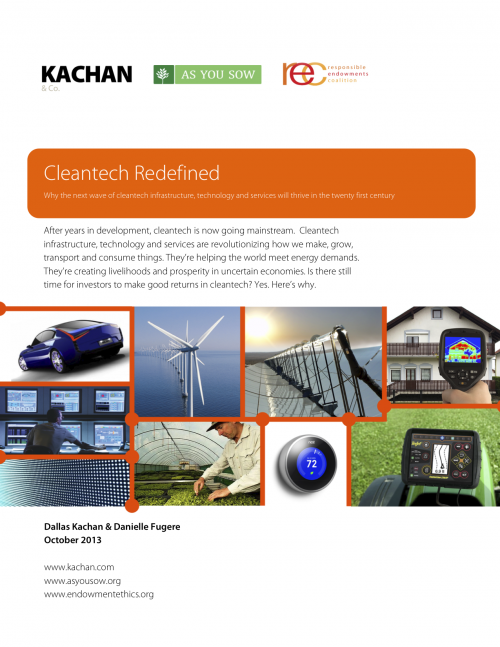
Macroeconomic drivers have reignited investment in clean infrastructure, technology, and services and expanded their reach across all sectors and industries, according to a new report from As You Sow.
Produced in partnership with cleantech research firm Kachan & Co. and Responsible Endowment Coalition, Cleantech Redefined: Why the Next Wave of Cleantech Infrastructure, Technology and Services Will Thrive in the 21st Century, describes and examines the latest investment opportunities and trends across clean energy, efficiency, lighting, water, transportation, building, agriculture, en- ergy storage, and industry.
“Now is the time for every organization to be looking at investing in cleantech,” commented Amelia Timbers, As You Sow Energy Program Manager. “The next Google-level success will be a cleantech firm that helps transition the economy from fossil fuels. Our report highlights promising companies and provides a great starting point for investor’s due diligence.”
This report is intended to be a framework to help investors understand the opportunities that currently exist to deploy capital into these markets, which are responding to unprecedented economic drivers, including resource scarcity, climate change, and the growing need for energy efficiency. The report explores these trends and how a broad range of companies are being built to meet, solve, and thrive in the face of these challenges while simultaneously reducing the demand for fossil fuels.
“It’s an exciting time to be investing in cleantech. The potential for growth is tremendous, especially in contrast with increasingly risky fossil-based resources,” said co-author Danielle Fugere, President of As You Sow. “Cleantech investment is ideal for endowments, pension funds, and other institutional investors seeking to achieve solid risk adjusted returns while maintaining energy sector exposure, and, most importantly, acting in their constituents’ best long term interests, both financially and environmentally.”
Learn more about As You Sow’s Cleantech Redefined report.
Investor Expectations for Conflict Mineral Reports
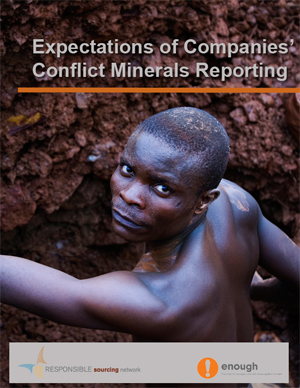
As companies prepare their first required reports disclosing their use of conflict minerals – tin, tantalum, tungsten, and gold – the Responsible Sourcing Network has partnered with the Enough Project to release a paper setting expectations for the contents of these inaugural filings.
In May of 2014, new legislation will require companies from a wide variety of industries including electronics, automotive, aerospace, and toys, to submit reports to the Securities and Exchange Commission disclosing information on the use of minerals sourced from the Democratic Republic of the Congo or neighboring countries. Human rights abuses linked to the mining industry such as sexual violence and kidnapping children to be soldiers have plagued the region for over 14 years.
Expectations for Companies’ Conflict Minerals Reporting describes the content that sustainable and responsible investors and human rights advocates expect to see. “Investors would like to see their companies establish baseline metrics the first year and specify the steps they are taking to determine the origin of all of their minerals to mitigate risk against conflict minerals,” said Patricia Jurewicz, director of Responsible Sourcing Network and co-author of the paper. “Then we can measure improvements in transparency and accountability reporting over time.”
The paper follows other reports from the Responsible Sourcing Network on ethical global supply chains, including To the Spinner, which provides guidance for companies seeking to avoid Uzbek cotton picked using forced labor.
Learn more about Responsible Sourcing Network’s Conflict Minerals program.
Nanoparticles Found in M&M’s, Pop-Tarts
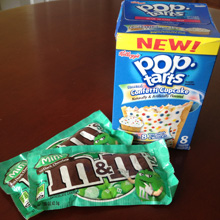
Our test results showed potentially harmful nanoparticles in Pop-Tarts and M&Ms.
Following our spring release of Slipping Through the Cracks: An Issue Brief on Nanomaterials in Food, As You Sow successfully ran an online crowdfunding campaign to test M&Ms and Pop-Tarts, among other foods, for potentially harmful nanomaterials. The lab results are back, and they show consumers have good reason to be concerned.
Both products contain nanomaterials that have undergone little or no safety testing. Research shows that these tiny particles are so small that they can easily penetrate cell walls and slip into organs, including the brain, with infants and children particularly susceptible. However, no companies that we are aware of disclose the presence of nanoparticles in their food products or food packaging. In fact, companies often are not even aware that nanomaterials may be moving into their products through their supply chains.
As You Sow is working to ensure that companies do not use nanoparticles until they are proven safe. To date there has been a lack of funding for long-term studies on the effects of various nanoparticles, while the research available has raised concerns about the impact of nanomaterials on human health and the environment.
“Public concern about nanomaterials in food are well justified, as our test results demonstrate,” stated Andrew Behar, CEO of As You Sow. “Families have the right to ask that these materials not be used in foods or, at the very least, that foods to be labeled so consumers can make informed purchasing decisions. If nanoparticles are being found in children’s sweets, where else might they be hiding? Without adequate testing and disclosure, consumers have no way of knowing.”
Learn more about As You Sow’s Nano initiative.
Shareholder Advocate and Donor Profile – Cari Rudd
Last fall I was introduced to As You Sow through a good friend. We were discussing how to “own what you own” in our investment portfolios. I knew I wanted to invest in responsible companies, but it never occurred to me that, as a shareholder, I had the power to transform corporate practices from the inside out. That was, until As You Sow walked me through the process.
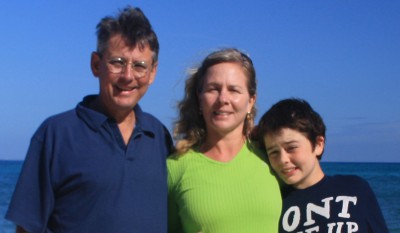
Cari Rudd and family
As You Sow was looking for shares of Abbott Labs. Abbott makes Similac, the world’s top-selling baby formula, using GMO corn and soy. I had used Similac with my own son when he was an infant. In fact, it was given to us in a gift basket at the hospital. My husband and I owned some shares and authorized As You Sow to file a shareholder resolution on our behalf.
The resolution was simple and straight forward. It basically asked Abbott Labs either to consider not using GMO ingredients in its Similac products or to label it clearly. As investors and parents, in light of recent research, we were uncomfortable with the use of GMOs. As You Sow presented the resolution on our behalf at the Abbott annual meeting for a vote. While Abbott disagreed with our concerns, we have developed a continued dialogue with them which has been productive. We plan to authorize As You Sow to refile the resolution at Abbott this year.
The process was an empowering experience. I got my wish to “own what I own.” I got to understand the inner workings of how to press for change in a major global corporation as a shareholder. I got to witness the power and leverage shareholders and consumers have in advocating for practices that are better for people and the planet. I’ve since become a donor to As You Sow and have asked friends and colleagues to join me in supporting their incredible work.
Thanks to As You Sow for guiding us through the process of becoming an active shareholder. It has been a productive journey.
139 Brands Worth Over $1 Trillion Sign Slave-Free Cotton Pledge
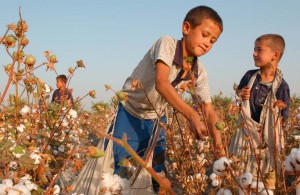
In Uzbekistan, children and adults alike are forced to work in the fields.
As Uzbekistan’s annual cotton fair wrapped up, a mounting number of international apparel brands and retailers declared their refusal to source cotton from the country until the forced labor of children and adults is eliminated. Representing over $1 trillion USD in market cap, 139 brands and companies have now signed the “Company Pledge Against Forced Child and Adult Labor in Uzbek Cotton.”
Ikea, lululemon, Marks & Spencer, and Joe Fresh are among the most recent companies to join the pledge. As a project of As You Sow, Responsible Sourcing Network is dedicated to bringing together investors, companies, and human rights activists to create sustainable supply chains, and has been collecting signatories for the pledge since 2011.
“We welcome these brands to the growing coalition of apparel companies taking a stand against oppression and forced labor in the Uzbek cotton industry”, said Patricia Jurewicz, Director of Responsible Sourcing Network. “Signing this common pledge demonstrates solidarity by the industry to block cotton using any form of slave labor from entering the global market.”
Although the Government of Uzbekistan for the first time is allowing the International Labor Organization (ILO) to conduct an inspection mission during the 2013 cotton harvest, ILO representatives are being accompanied by Uzbek officials, making it difficult for citizens to speak openly. Tragically, despite of the inspectors, the death of six-year-old Amirbek Rachmatow on September 15th was one of eight fatalities in the first two months of the harvest. Continued forced mobilization of children and adults has been well documented this year.
In addition, Responsible Sourcing Network is currently working on a Company Ranking, due out early next year, which will analyze companies’ efforts to keep cotton tainted with slave labor out of their supply chains.
Learn more about Responsible Sourcing Network’s Cotton program.
Talk Divest-Invest: Investors Mentor Network Launched
Superstorms like Hurricane Sandy and Typhoon Haiyan, which has killed thousands of people in the Philippines, are sobering reminders of the immediate seriousness of climate change. Students around the world are challenging their university endowments to divest from fossil fuels and reinvest in clean infrastructure, technology, and services.
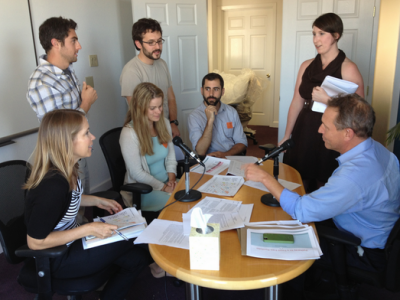
Clockwise from right: As You Sow Founder Tom Van Dyck, President Danielle Fugere, Brett Fleischman of 350.org, Dan Apfel of the Responsible Endowments Coalition, UC students Katie Hoffman and Ophir Bruck, and As You Sow Energy Program Manager Amelia Timbers talk about carbon divestment.
To help students explain complex financial issues to their endowment trustees, As You Sow, working with 350.org, created Talk Divest: the Fossil Free Financial Mentorship Project. The project brings together financial professionals and student divestment campaigns, and is designed to equip campaigners with the financial arguments, data, and analysis needed to demonstrate that divesting from fossil fuels is not only a moral imperative, but also a sound financial action. For the pilot program, students from the University of California divestment-reinvest campaign met with As You Sow founder Tom Van Dyck to discuss these issues. The session was filmed and the footage will be turned into a tutorial and made available to students.
As You Sow is proud to have been a pioneering organization in the college campus carbon divestment-reinvestment movement that started in 2010. Along with coalition partners at Responsible Endowments Coalition, Sierra Student Coalition, Energy Action Coalition, California Student Sustainability Coalition, and the Sustainable Endowments Institute, we created the first tools and structures to assist students in persuading their university endowment trustees that divesting from carbon-based industries is not only critical but also fiscally responsible.
Carbon divestment and clean energy reinvestment is now taking its place among the key strategies for curtailing climate change. This past summer, President Obama gave a speech on climate change that pointed to carbon divestment and clean reinvestment as a tool citizens can use to fight climate change. So far, seven colleges and universities, over a dozen religious institutions, and nearly two dozen cities have committed to pursue fossil fuel divestment, reinvesting those monies in clean energy infrastructure, technology, and services.
Learn more about As You Sow’s Carbon Divestment initiative.






















